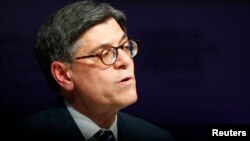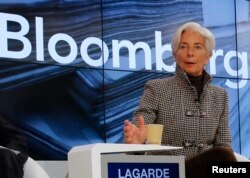Plunging oil prices have roiled world stock markets in the first weeks of 2016, but U.S. Treasury chief Jack Lew says cheap oil is benefiting consumers across the globe.
Thursday, Lew told the annual World Economic Forum at the Swiss ski resort in Davos that with crude oil now below $27 a barrel on the world market, consumers "have more money in their pockets," to buy products they need or improve their household finances by paying down debt or saving.
He said low prices do not have "to be bad for the overall global economy."
Lew said the slowdown in Chinese economic growth, the other main factor in the world stock market turmoil, was not not a surprise. But he said it shows Beijing needs to press ahead with a "long and difficult transition" to change the Chinese economy from focusing on exports to a more consumer-driven economy.
"The question that should be asked right now," Lew said, "is will China stick to the reform policies that open up its markets?"
China's growth
International Monetary Fund managing director Christine Lagarde said poor communication by Chinese economic managers has contributed to worries for investors about the immediate future of the world economy.
She said uncertainty about the value of the Chinese currency, the renminbi, is at the center of current fears about China's economy, the world's second largest after the United States. China this week said its economy grew by 6.9 percent last year, its slowest growth in a quarter century.
Lagarde said she thinks "better and more communication" from China about its move toward a consumer-driven economy "will certainly serve that transition better."
Feng Xinghai, the vice-chairman of China's securities regulator, conceded that "in terms of communication we should do a better job."
But he added, "We have to be patient because our system is not structured in a way that is able to communicate seamlessly with the market."





